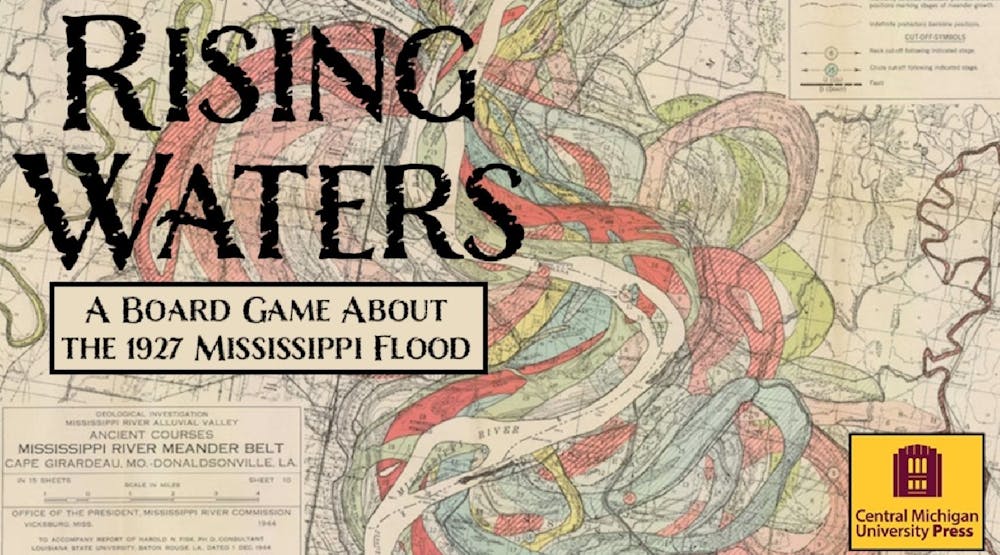CMU Press kickstarts game about 1927 Mississippi flood
A faculty-run Central Michigan University organization is selling its new board game that spurred from a collaboration with an Alabama native.
CMU Press, the university's scholarly press, is currently selling Rising Waters - a board game which focuses on the Great Mississippi Flood of 1927 - on its website and in the CMU Bookstore.
In the game, 2 to 4 players are given a weather report indicating the intensity of the upcoming flood. As the damage worsens, players work to save their communities.
“The game centers [on] African Americans, to help players understand and empathize with their plight during the 1920s environmental disaster,” CMUP said online. "In the game, you will confront two forces -- racism from white landowners and the power of nature. Persevere by drawing on your community's courage and strength from your family, church, music, farming and education."
CMUP launched a website on Oct. 4 to spread awareness about the game. As of publishing on Oct. 19, 234 people have 'backed' the game and it has raised $14,811 over its $13,000 goal. Davis said she and her colleagues can supply 500 copies if they get enough supporters.
The game was reviewed by eight historians and gaming experts, according to CMUP director CMUP director and associate professor of English Language and Literature.
“We wanted to make sure we were doing the best game possible,” she said. “We wanted it to be culturally accurate and respectful."
Rising Waters is designed by Elizabeth Blum, an environmental historian at Troy University in Alabama. Blum submitted her work to the Zenobia contest, where it made the top 12 finalists. CMUP invited Blum to publish her game.
“I really enjoyed working with CMUP," Blum said. "They are great people, very supportive and helpful."
Lamaro Smith and Makiyah Alexander created the art for the project.
About CMUP
CMUP, a scholarly press, was an initiative of Center for Learning through Gaming and Simulations at CMU.
It is run by faculty members, Tracy Davis, Jon Truitt and Andrew Devenney. The editorial board is comprised of faculty and staff members, Wendy Robertson, Monica Evans, Daria Kluver, Gretchen Papazian and David Simkins.
Davis said it is the first peer-reviewed gaming press in the U.S.
The press publishes analog games such as board games, card games, dice games and role-playing games for educational purposes.
“The whole idea of all of our games is that you can play it in a classroom and you can play it at home,” Davis said.
Davis said that CMUP hopes to offer internships to students.
According to Davis, CMUP's games are reviewed by 2 to 3 experts in gaming and historical content.
“We want it to be historically accurate,” Davis said.
The first CMUP game, Monumental Consequence, was released in October 2021. It was designed by artist and educator Mary Beth Looney. Art was created by CMU alum Bill Spytma, and 500 copies of the games were sold.
CMUP is planning its next game, called “500-Year-Old Vampire”, which is about art history.
“Hydrologic Cycle,” a game by Robertson about hydrologic science, is going to be re-launched.
What is the Mississippi Flood of 1927?
Rising Waters features the Mississippi Flood of 1927, which according to Blum, was the “catastrophic flood of the 20th century."
“It was a tragedy. A less-known tragedy," Brittany Fremion, environmental history faculty and a reviewer of the game, said.
In fall 1926, there was a lot of heavy rain. In spring 1927, water spread to the Mississippi River from across the region.
Barriers failed. At the time, they used a levee system, where the ground was high on the sides to keep the river in its place.
“That was a big mistake,” Blum said.
In the south at the time, racism and Jim Crow segregation laws reigned. Blum said Red Cross helped white people everywhere, but Black people had to be in camps in order to get help.
African Americans lost their homes and communities after white landowners forced them to destroy the levees, changing the direction of the water and ultimately flooding their land, Davis said.
“We have an image of 1920s when we think of dancing, liquor and businesses,” Blum said. “People forget the Mississippi flood was a big part of the (19)20s.”
Blum compared the treatment of African Americans during the Mississippi Flood of 1927 to that of Hurricane Katrina in 2005. African Americans were displaced and mistreated in both events, she said.
“The game is timely in terms of climate change and in terms of racism,” Fremion said.





